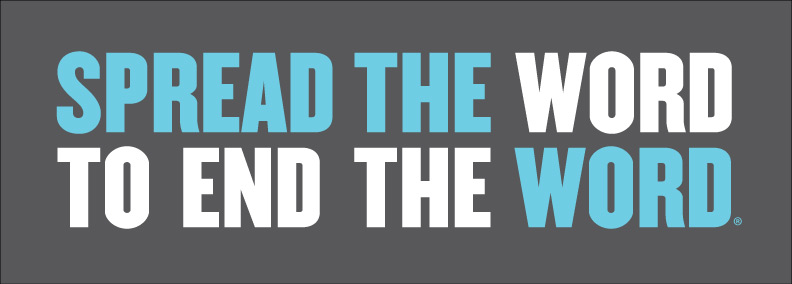Here's a bit of good new for you all:
Spring will be here in less than two weeks! The date technically is
not indicative of sunshine and warmer air, but we can hope, right?
Maybe?
It has been a while since I've shared
any of my personal musings on this blog, but today I've got some
thoughts that will hopefully prompt some interest on your behalf.
Some of you may be aware of the promotion by Spread the Word to End the Word to end the use of the word “retard(ed)”. March
5th was their declared day of awareness, and there was a
huge push for people to pledge to stop saying the r-word. If you
didn't know about it, that's okay; I don't think a lot of people
outside a certain community did. I found, though, after scrolling
through various media sites, that interest in this issue seems to be
spreading out from a specific group of people—those involved in
some way with the disabled community—to a wider audience.
I will admit that I have my aversions
to Huffington Post's in-process transition from journalistic-focused
reporting to pop-culture, often pulpy, articles. (For example, a
piece entitled “Fort Knox Installs First Female Commander” sits
right next to one entitled, simply, “CAFFEINATED. BACON. WAFFLE.”
These are the changes in media that haunt and terrify me.) However,
this somewhat awkward intersect offers an interesting and useful look
at what issues our society deems worthy of attention.
In my Huffington perusal, I found post
after post about disability, particularly about inclusion and ending
the use of the r-word. This struck me as a good thing for a few
reasons:
1. I usually have to do a specific search to find articles related to disability, and here were a bunch, readily available without having to dig. They aren't hidden in the back corners of a website.
2. This community is getting attention in both journalistic and popular culture contexts.
3. The quantity, variety, and visibility of these articles indicates a demand for information on these topics. That is, people find these issues important, are interested in them, and want more.
 |
| John "Frank" Stephens |
It's not just that stories like John Stephens's letter to Ann Coulter are being written, it's that people find those stories and their
content pressing and significant in the context of today's social
system. That disability and ability awareness articles are showing up
in what appears to be a higher concentration on websites like
Huffington Post is noteworthy, because it says (to me, at any rate)
that disability issues spark the widespread, pop-culture interest
that, say, a caffeinated bacon waffle does, while also maintaining a
deserved element of seriousness.
Issues that once seemed isolated to
a certain group are now becoming accessible to more people, and that
is great. Because of this shift, I think the disability rights
movement has the potential to become a hot issue, especially among
young people, much like gay rights and the push for marriage equality
has gained widespread attention and support through various online
platforms. I hope, too, that it won't be long before we see people's
pledges to end the use of the r-word popping up in our Facebook and
Twitter feeds in mass support.
What do you think? Have you noticed a
change in the attention disability issues get in the media? Are you
going to take the pledge?




No comments:
Post a Comment